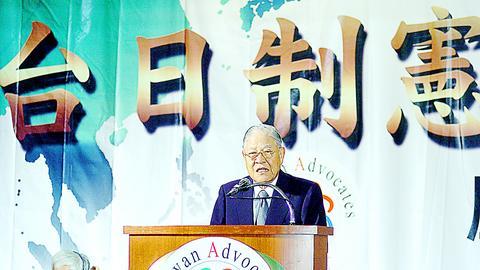Former president Lee Teng-hui (
But after offering this blunt criticism, Lee toned down his disapproval of Chen's speech, saying that he understood Chen's difficulty because he had also said "the Republic of China is on Taiwan" when he was the president, and "this is the way things are," Lee said.

PHOTO: YEH CHIH-MING, TAIPEI TIMES
Lee made the remarks during a symposium in which many Japanese and Taiwanese academics discussed the evolution and development of the constitutions of Taiwan and Japan and the stability and security of Asia, held by the group Taiwan Advocates yesterday. Lee gave a speech entitled "Only if Taiwan makes a new constitution can the stability and security of Asia be permanently assured."
During his speech, Lee refuted Chen's position as outlined in his National Day speech that "the Republic of China is Taiwan, and Taiwan is the Republic of China" as rhetoric that "deceived himself as well as others."
"Besides, there was no `1992 consensus.' I was the president at that time and I knew there was no such thing," Lee said.
As Taiwan's president for 12 years, Lee said that he deeply believed that the concept of a "Republic of China" was simply a case of the "emperor's new clothes," designed to cheat the people of Taiwan.
"No one in international society knows what `Republic of China' is," Lee said.
"If the people of Taiwan continue to be limited to the context of `Republic of China,' Taiwan will neither join the international community nor resolve the instability in the Taiwan Strait," Lee continued. "If the people of Taiwan don't terminate this abnormality of Taiwan by making a new constitution, and choose to escape from reality with the excuse of maintaining the `status quo,' it will be an irresponsible attitude for ourselves, our descendants and the peace and stability of Asia."
Lee said that the Constitution of the Republic of China does not meet the present conditions of Taiwan, and only traps Taiwan into the legal snare of "one China."
Lee stressed that the Republic of China maintains the "one China" system in jurisprudence, and thus emboldens China to invade Taiwan thereby threatening to spark the biggest crisis in the region.
"China will continue to take advantage of such legal snares and will disseminate propaganda to the international society that the Taiwan issue is an internal affair of China, which will eventually subject Taiwan to China's military threat," Lee said.
The fundamental solution to protect Taiwan from the threat of China is to create a believable and reasonable constitution for Taiwan, Lee said, adding that he anticipates achieving this goal by 2007.
Lee also suggested that Taiwan be ruled under a three-branch system (

Intelligence agents have recorded 510,000 instances of “controversial information” being spread online by the Chinese Communist Party (CCP) so far this year, the National Security Bureau (NSB) said in a report yesterday, as it warned of artificial intelligence (AI) being employed to generate destabilizing misinformation. The bureau submitted a written report to the Legislative Yuan in preparation for National Security Bureau Director-General Tsai Ming-yen’s (蔡明彥) appearance before the Foreign Affairs and National Defense Committee today. The CCP has been using cognitive warfare to divide Taiwanese society by commenting on controversial issues such as Taiwan Semiconductor Manufacturing Co’s (TSMC, 台積電) investments in the

INVESTIGATION: The case is the latest instance of a DPP figure being implicated in an espionage network accused of allegedly leaking information to Chinese intelligence Democratic Progressive Party (DPP) member Ho Jen-chieh (何仁傑) was detained and held incommunicado yesterday on suspicion of spying for China during his tenure as assistant to then-minister of foreign affairs Joseph Wu (吳釗燮). The Taipei District Prosecutors’ Office said Ho was implicated during its investigation into alleged spying activities by former Presidential Office consultant Wu Shang-yu (吳尚雨). Prosecutors said there is reason to believe Ho breached the National Security Act (國家安全法) by leaking classified Ministry of Foreign Affairs information to Chinese intelligence. Following interrogation, prosecutors petitioned the Taipei District Court to detain Ho, citing concerns over potential collusion or tampering of evidence. The

‘COMPREHENSIVE PLAN’: Lin Chia-lung said that the government was ready to talk about a variety of issues, including investment in and purchases from the US The National Stabilization Fund (NSF) yesterday announced that it would step in to staunch stock market losses for the ninth time in the nation’s history. An NSF board meeting, originally scheduled for Monday next week, was moved to yesterday after stocks plummeted in the wake of US President Donald Trump’s announcement of 32 percent tariffs on Taiwan on Wednesday last week. Board members voted to support the stock market with the NT$500 billion (US$15.15 billion) fund, with injections of funds to begin as soon as today. The NSF in 2000 injected NT$120 billion to stabilize stocks, the most ever. The lowest amount it

NEGOTIATIONS: Taiwan has good relations with Washington and the outlook for the negotiations looks promising, Minister of Economic Affairs J.W. Kuo said Taiwan’s GDP growth this year is expected to decrease by 0.43 to 1.61 percentage points due to the effects of US tariffs, National Development Council (NDC) Minister Paul Liu (劉鏡清) said at a meeting of the legislature’s Economics Committee in Taipei yesterday, citing a preliminary estimate by a private research institution. Taiwan’s economy would be significantly affected by the 32 percent “reciprocal” tariffs slapped by the US, which took effect yesterday, Liu said, adding that GDP growth could fall below 3 percent and potentially even dip below 2 percent to 1.53 percent this year. The council has commissioned another institution